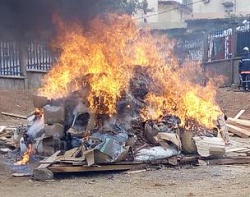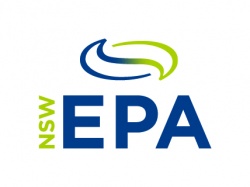
Search archive
Fighting back – Cameroon sets fire to 3000kg of pangolin scales
27/02/2017

On the eve of World Pangolin Day, Cameroon’s two major cities, Yaoundé and Douala, were set ablaze by the country’s Minister of Forestry and Wildlife, Philip Ngolle Ngwese.
Known for their tough stance on illegal wildlife traffickers and following last year’s burning of its ivory stockpile, on 17 February the Cameroon government burnt 3094kg of seized pangolin scales.
Pangolins, often called “scaly anteaters,” are covered in tough, overlapping scales. These burrowing mammals eat ants and termites using an extraordinarily long, sticky tongue and are able to quickly roll themselves up into a tight ball when threatened. There are eight different pangolin species found across Asia and sub-Saharan Africa. Poaching for illegal wildlife trade and habitat loss have made these incredible creatures one of the most endangered groups of mammals in the world.
They are traditionally used in Chinese medicine to disperse blood stasis, reduce swelling, cure abscesses and reduce pain due to rheumatism and arthritis.
In the ongoing fight against the poaching of pangolin, the world’s only mammal with scales, the Cameroon haul was seized from traffickers in airport stings, on their way to China.
Since 2013, there has been an upsurge in trafficking of pangolin scales, with several tons being seized each year. According to the Cameroon wildlife minister, 8134kg of pangolin scales were detected between 2013 and 2016. Of this number 5040kg are under seal as suspect traffickers are facing trial in a court in Douala, Cameroon’s economic capital. The rest, 3094kg, have been burnt.
Until the last Convention on International Trade in Endangered Species (CITES) COP17 meeting in Johannesburg, South Africa, last year, only the giant pangolin was completely protected. In the face of exponential increase in scales trafficking, CITES has declared all pangolin species protected.
“The burning of these scales reaffirms the determination of the government of Cameroon to fight against wildlife trafficking in general and pangolin scales in particular.” Minister Ngwese said.
Cameroon, alongside other pangolin range countries, is battling to stem this new wave of scales trafficking with the support of WWF.
According to Dr. Hanson Njiforti, WWF Cameroon Country Director, the government of Cameroon has taken a bold and proactive step to save what is left of pangolins in the forest.
“The bigger challenge now is to stop the traffickers from killing the pangolins because 8000 kg of scales means several thousands of pangolins have been killed.” Dr. Njiforti said.
QAL pleaded guilty and fined $400,000 for releasing contaminated steam
23/02/2017
Queensland Alumina Limited (QAL) has been convicted for causing serious environmental harm to the central Gladstone community from releasing 7.1 tonnes of contaminated steam in June 2015.
QAL was fined $400,000 in the Gladstone Magistrates Court (14 December), and ordered to pay $11,382 in legal and investigation costs, on a charge of causing serious environmental harm.
QAL pleaded guilty to the charge and a conviction was recorded.
QAL held an environmental authority (EA) to operate an alumina refinery at Gladstone.
On 10 June 2015, the Court was told how QAL released contaminated steam containing dissolved alumina, sodium hydroxide and insoluble bauxite residue into the atmosphere, in contravention of its EA.
It was estimated some 7.1 tonnes of contaminants were released impacting residential and commercial districts in central Gladstone.
There were more than 1130 property damage claims made for the repair of vehicles and buildings within the path of the contaminant plume.
The Court was told the release occurred when a safety relief valve system activated during the commissioning of refinery equipment.
The Court ordered that a total of $150,000 of the $400,000 fine be paid to three community based organisations—$50,000 each to the Gidarjil Development Corporation, Port Curtis Harbour Watch, and the Conservation Volunteers Organisation—to assist in undertaking their projects for the purpose of enhancing the environment in a public place, for the public benefit.
EHP is a strong environmental regulator which is committed to a vision for a sustainable and prosperous Queensland.
Source: Department of Environment and Heritage Protection Queensland
NSW EPA updates its approach to enforceable undertakings
22/02/2017

The NSW EPA has just released its updated policy and process for negotiating enforceable undertakings. You can find the EPA’s policy and accompanying documents on the EPA website.
Enforceable undertakings are voluntary and legally binding written agreements between the EPA and an operator who is alleged to have breached the EPA’s legislation. The agreement contains details of the commitments made by the operator in response to the alleged breach. The main benefit of an enforceable undertaking is that they are an efficient, flexible and transparent tool that can obtain fit-for-purpose commitments from operators.
Enforceable undertakings are a regulatory option when there has been a serious breach. They are a more serious regulatory response than a written caution or penalty notice but less serious than a criminal prosecution.
The new package delivers the following improvements:
A clearer process for negotiating enforceable undertakings. For example, the EPA has introduced an application form that must be completed by any operator proposing to negotiate an enforceable undertaking with the EPA.
What an acceptable enforceable undertaking must include. For example, any proposal will generally need to go beyond mere compliance; the operator will need to consider if there are any industry-wide applications for the lessons learnt and if so how they can be shared; guidance on negotiating appropriate projects for the benefit of the environment or community.
What the EPA expects from any party that decides to enter into an enforceable undertaking negotiation process (e.g. the operator must be co-operative and forthcoming; the standard conditions of an enforceable undertaking).
You can access copies of all enforceable undertakings entered into by the EPA here.
If you are interested in the policy development process for this project you can contact continuous.improvement@epa.nsw.gov.au
Register for service station vapour recovery workshops by 24 February
16/02/2017

The NSW Environment Protection Authority (EPA) is running a second round of workshops for council officers to provide practical information and guidance about vapour recovery technology and compliance. These workshops will be particularly useful to environment, regulatory or planning staff.
The NSW Clean Air Regulation requires the installation of control equipment to reduce petrol vapour emissions at service stations.
On 31 January, 2017 regulatory responsibility for vapour recovery was transitioned to councils, with the EPA continuing to manage non-compliant VR sites.
As the compliance role is new for environment officers within councils the EPA is providing support in the transition process until 30 June, 2017.
Registration for the workshops is limited to two officers per council at the following locations. Please register by 5pm, Friday 24 February 2017:
Tuesday, 7 March (Hurstville)
Thursday, 9 March (Parramatta)
Friday, 10 March (Sydney CBD)
For more information and to reserve your place please register.

